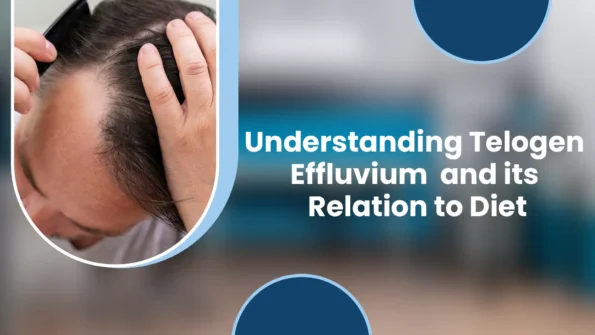Telogen Effluvium (TE) is the most frequent cause of hair loss and is associated with diffuse and nonscarring hair loss. Essential heavy metals that our bodies need are Zinc, Manganese, Lead, Cadmium, Magnesium, Iron, Copper, and Cobalt. These heavy metals have been associated with beneficial effects in humans as well as in other living organisms. These are highly effective and the foods that we eat provide us with our needed mental balance. Zinc helps in the immune system, Iron helps in blood circulation and all the other elements strengthen our body. A telogen effluvium diet includes nutrients like iron, zinc, and biotin to support hair regrowth and reduce shedding.
Telogen Effluvium and its Relation to Diet
However, they can also lead to toxic effects when the amount exceeds its prescribed limit. Your body can tolerate only up to a limit of these products. If any of the above-mentioned heavy metal content increases your body may undergo some serious chemical changes which can lead to serious repercussions.
There are several ways heavy metal exposure can occur:
- Occupational exposure: This is common in mining areas where workers inhale dust containing these metals.
- Air pollution: Industrial emissions and vehicle exhaust can pollute the air with heavy metals.
- Soil erosion: Contaminated soil can release heavy metals into the environment.
- Natural environment exposure: Volcanic eruptions and natural weathering can release heavy metals.
- Diet: Consuming excessive amounts of certain foods (e.g., some shellfish) can lead to heavy metal overload.
Importance of Diet in Preventing Hair Loss
It is common to eat what we like, which is very good. However, it is equally important to know the nutritional content of our food. Being aware of and managing your diet can help prevent hair loss. A recent study published in the “Yearbook of Dermatology: Trichology” (2019) revealed that high levels of heavy metals in the body, ranging from Cadmium (Cd) to Zinc (Zn), can cause Telogen Effluvium, a form of hair loss. Elevated levels of heavy metals in the body have been linked to hair loss. For example, smoking increases Cadmium levels in the blood, urine, hair, and other tissues, leading to more hair loss.
Steps to Prevent Hair Loss
Quit Smoking
Stop smoking immediately to reduce hair loss. Smoking has been shown to increase Cadmium levels in the body, which can lead to hair loss.
Watch Your Diet
Pay attention to what you eat and in what quantities. Knowing that meats contain high levels of Zinc, which has been associated with hair fall, can help you make better dietary choices to prevent hair loss.
Maintain Hair Hygiene
Always wash your hair after spending a day outside and dry it gently with a towel. Wet hair is weak hair, and the weaker the hair, the weaker your looks.
Handle Wet Hair with Care
Remember, wet hair is more vulnerable to damage. Be gentle when handling wet hair to prevent it from weakening further.
Seek Professional Help
If you are experiencing telogen effluvium, it is important to see a doctor to determine the underlying cause and get appropriate treatment. In many cases, TE will resolve on its own within a few months. However, there are treatments available that can help to speed up hair growth and reduce hair shedding.
For any hair loss issues or questions, you can consult with us at HairFree and HairGrow. Solving your doubts and concerns is our personal happiness. Be carefree when you come to HairFree and HairGrow.
Our centers, located in Surat, Pune, Mumbai, Gurugram, Kolkata, Bhopal, Hyderabad, Ahmedabad, Indore, Delhi (Gurugram), Haridwar, Nagpur, Vapi (Silvassa), and Vadodara, are equipped to provide the best care and results.
For more details, call or WhatsApp us at: +91-7272832222.
Written By
MBBS, DDV
Dr. Shridevi Lakhe is a renowned hair specialist focusing on telogen effluvium diet solutions. Her expertise lies in combining nutrition and science to address hair loss effectively, promoting recovery and ensuring lasting scalp and hair health for her patients.
Disclaimer
We’ve made all possible efforts to ensure that the information provided here is accurate, up-to-date and complete, however, it should not be treated as a substitute for professional medical advice, diagnosis or treatment. See Detailed Disclaimers Here.


